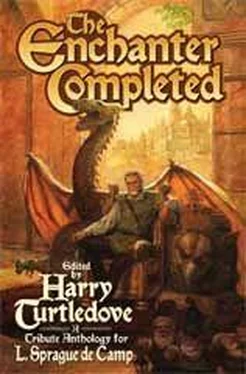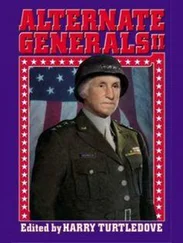Harry Turtledove (Editor)
The Enchanter Completed
Sprague: An Introduction
Harry Turtledove
L. Sprague de Camp changed my life.
About how many people can you say that? Not many, not if you're honest. A favorite teacher, perhaps, who pointed you in a direction you hadn't expected to go. That's what L. Sprague de Camp (Sprague, to his friends) did for me?and he did it more than twenty years before I ever met him, and, of course, altogether without knowing he'd done it or that I even existed. Writers, especially the good ones, can be dangerous people.
I was fifteen, I think, when I found a copy of Lest Darkness Fall in the secondhand bookstore I frequented in those days. For any who may not know it, it's one of the best Connecticut Yankee in King Arthur's Court stories ever written: right up there, in my admittedly biased opinion, with Twain's original. Before I read about Martin Padway's involuntary journey through time to the Italy of the sixth century a.d., I don't believe I'd ever heard of the Byzantine Empire. Because of Sprague, I got interested in it. If I hadn't happened across Lest Darkness Fall , I might well not have.
As things were, I got into Caltech, and flunked out at the end of my freshman year. When I got to UCLA, I'd left the sciences and become a history major?and ended up with a doctorate, Lord help me, in Byzantine history. I never would have done that had someone else picked up that book instead of me. I never would have written much of what I've written, a lot of which is either Byzantine-based or uses the historical and research skills I picked up acquiring my degree. I never would have met and married the lady who's now my wife, for we got to know each other when I was teaching at UCLA while the professor under whom I studied had a guest appointment at the University of Athens. I wouldn't have the three girls I have today.
Other than that, finding Lest Darkness Fall all those years ago didn't change my life at all.
De Camp had no small effect on the fields of science fiction and fantasy, either. Working alone and in collaboration with Fletcher Pratt, he helped expand the fields by using their techniques to examine not just the present and future but also the past, and by using modern viewpoint characters to get inside works of literature written from a very different perspective. Along with Lest Darkness Fall , the Harold Shea stories collected in book form as The Incomplete Enchanter, The Castle of Iron , and Wall of Serpents have been in print almost continuously for the past sixty years.
Sprague's special virtues were logic, clarity, and a sympathetic understanding for the foibles of mankind. The heroes he created himself were always recognizably human and flawed, much more likely to try to work their way out of trouble with a quip and a smile than by smashing through whatever was in their way. (I am conscious of the irony of Sprague's having been a major factor in the rediscovery of Robert E. Howard's Conan, and in his often working in Howard's universe. Everyone's entitled to a little time off from what he usually does, and writers have to pay their bills no less than any other mortals?and I don't think anyone but Howard ever wrote Conan so well.) His own special science-fiction universe was that of the Viagens Interplanetarias ("Interplanetary Voyages" in Portuguese?Brazil is the leading country in this universe), which includes Rogue Queen (among other things, a splendid satire on Marxism), the stories collected in The Continent Makers , and many novels set on the low-tech world Krishna, which offers both science and swashbuckling a chance. Sprague did not believe faster-than-light travel was possible, and so did not include it in this universe; the Lorenz-Fitzgerald contractions play a role in more than one story.
This is typical. De Camp's worlds always feel real and thoroughly lived in. When he wrote of things, he knew whereof he spoke. He learned to fence and to ride a horse. He traveled widely all over the world, which helps make his series of historical novels set in classical Greek and Hellenistic times? The Dragon of the Ishtar Gate, The Arrows of Hercules, An Elephant for Aristotle, The Bronze God of Rhodes , and The Golden Wind ?uniquely authoritative. Along with the novels of Mary Renault, de Camp's give the modern reader the best feel for what it was like to live in those times.
Trained as an engineer (unlike yours truly, he graduated from the California Institute of Technology), Sprague entered the job market during the Depression, when, essentially, there was no job market. The only time he worked in engineering was during World War II, as a naval officer stationed in Philadelphia, where he, Robert A. Heinlein, and Isaac Asimov fought the war with flashing slide rule, as he was fond of saying.
He used his technical training in his writing, though (to writers, nothing ever goes to waste), both in his fiction and in informative, lively nonfiction on subjects as diverse as engineering in the ancient world, Atlantis, the elephant, American inventions in the nineteenth and twentieth centuries, dinosaurs, and the Scopes monkey trial. He wrote an authoritative biography of H.P. Lovecraft, and another of Robert E. Howard.
I first made his acquaintance more than twenty years ago now, after I had a novelette in Asimov's and George Scithers, who was then editing the magazine, mentioned in the front material my debt to Lest Darkness Fall . Sprague sent George a postcard for forwarding to me, saying he'd liked the story and was pleased he'd had something to do with the shape of my career. I walked on air for days after that. When I published a translation of a Byzantine chronicle a year or so later, I sent him a copy, wondering if he might use incidents from it in fiction of his own (so far as I know, he never did).
We met in the flesh in Atlanta, at the 1986 World Science Fiction Convention. He was, as always, unfailingly kind to someone starting out. Later at that convention, we were on a panel together. He made a Byzantine allusion and then turned to me, asking if he'd got it right. He had, of course. That he made the gesture, though, speaks volumes about the sort of gentleman he was. After that, we'd see each other once or twice a year at conventions, and would write back and forth every couple of weeks or every month up till late 1999, not quite a year before he died. I'm not and never have been a whiskey drinker, but I'll always cherish the knocks of Johnnie Walker over ice I had in hotel rooms with him and Catherine.
Personally, he was tall, handsome, and elegant, and, till near the end, looked ten or fifteen years younger than he was. I was sad to watch him get slower and more frail as the years went by. The last convention where we met was in 1994 in Dallas, and he was not moving around well at all by then. (Even so, at dinner one evening there, he started talking in Swahili with another writer who'd recently been to Africa.) Later, he suffered a broken wrist, a broken hip, and perhaps a series of small strokes, and also had to endure his wife's sinking into Alzheimer's in the couple of years before she passed away.
Sprague and Catherine Crook de Camp were married for more than sixty years. It was, I think, the best marriage I ever saw. It made all the old cliches about finishing each other's sentences and putting up with each other's foibles look good. When he lost her the spring before he died, everyone knew he would join her again before long. And by what he, always a staunch rationalist, would undoubtedly have called pure coincidence, he died on her birthday, November 6, three weeks before his own ninety-third.
He won the Gandalf Grand Master Award from the World Science Fiction Convention, and was also named a Grand Master by the Science Fiction Writers of America. Even so, his works, these days, are less well remembered than they ought to be, not least because he was modest almost to a fault. When he appeared on one of the trading cards the 2000 Worldcon put out, his quote on the back read simply, "I've been lucky." Maybe he was, but he was also very, very good.
Читать дальше












